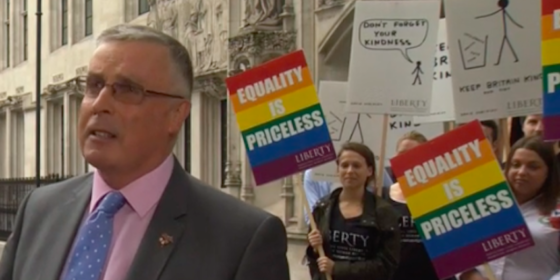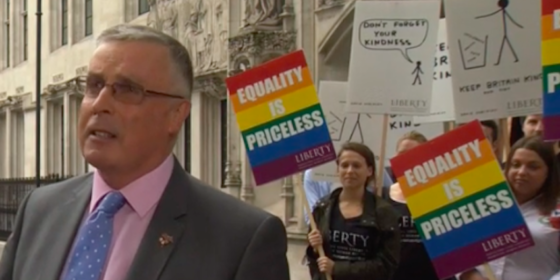
Yesterday the UK Supreme Court ruled same-sex married couples should get the same pension benefits as straight couples.
That is very welcome. Of course, this should never have been the case as surely equal marriage should be – well, equal.
Obviously we applaud the ruling and John Walker for bravely bringing this case forward on behalf of the LGBTI community.
But this does bring up a number of big questions.
EU law won this case, so what will Brexit mean?
Firstly, it was an EU law that protected the couple’s pension rights. It was ultimately EU law that was used to win the case.
With the UK leaving the EU, how can these protections be maintained? And will the fact the DUP – a party implacably opposed to marriage equality – is now propping up the UK government impact these protections?
It is really important the LGBTI community is aware of these kind of issues. We must seize the opportunity to lobby and push for our rights and protections to be maintained.
How we can make sure this ruling sticks
Some companies already, voluntarily, allow same-sex pension benefits. The Supreme Court ruling means companies that don’t do that already will now need to do so.
It will be important the LGBTI community ensure our employers now obey this ruling and offer us truly equal treatment. LGBTI employee groups can play a big part in this, in companies where they exist.
Many companies may simply not have caught up with the practicalities of benefits for same-sex couples and may need to adapt documentation.
We are failing to seize the rights we’ve got
It is also clear the LGBTI community has a good deal of catching up to do. We often have rights but they haven’t always been implemented and enforced.
For example, many of us started our pensions when it either wasn’t possible to include or protect our partner or we were ‘in the closet’ and chose not to include our partner. As such, whilst the law may protect us, we may not be protecting ourselves.
I talk with many people who have simply not thought about these issues. For example, they may not have included their partner as a beneficiary in their pension, even though they could.
Many companies also offer other employee benefits, such as life insurance or healthcare. And many of us do not include our same-sex partners. Research shows that is a result of decades of discrimination.
In the past, it was very difficult to have protection or achieve benefits as a same-sex couple. So even today, many of us just haven’t sorted this. We are effectively letting past discriminations affect future benefits.
LGBTIs are unprepared for retirement
This naturally leads to a broader discussion about how the LGBTI community plans for partner protection and retirement.
The majority of same-sex couples still don’t have marriage protection and therefore will not benefit from the legal protection of marriage. There may be things that we can do like adding a partner as a beneficiary to our pension or other employee benefit. This will depend on individual company rules but it’s important to check.
It is very important that we look at protection for our married or civil partners. Where appropriate, take advantage of benefits that may be offered – especially where they require action and are not automatic.
If you are married and with an occupational pensions, you will benefit from John Walker’s victory. It can also be a significant wake up call to the LGBTI community to check our benefits and make sure we take advantage of all that’s available to us.
LGBTI pensions: What to think about
A few things to consider are:
- If you’re married or civil-partnered, make sure your company is offering you pensions benefits for your partner.
- Check what benefits your company offers for straight couples. Make sure they offer them for you too.
- Check you have included your partner as the beneficiary where this might be appropriate, even if you’re not married.
- If you’re not formally partnered, make sure you have thought about how to protect your partner.
Finally, recent research has shown the LGBTI community is not generally planning effectively for retirement. There have been many positive developments, including this case, recently. But we are not taking advantage of all that’s available to us.
It’s really important to check on our employee benefits and if in doubt, get advice on how to plan and protect our future.
We’ve just launched a free LGBTI retirement guide. It covers these issues in more detail, with information every age group should read. Equality Wealth will also provide a free consultation on your pension arrangements, through our partner LGBT-accredited advisers.
Loading…
Paul Thompson is a co-founder of Equality Wealth.







